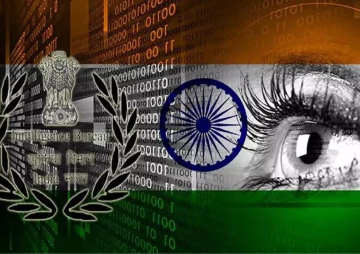
According to a Wall Street Journal report, Palestinian Islamic Jihad (PIJ) and Hamas raised over US$130 million in cryptocurrency from August 2021 to June 2023. Digital currencies like Tron, Bitcoin, and Tether are revolutionising financial transactions and charitable giving, with Reuters noting that nearly two-thirds of Tron Wallets are linked to terrorist organisations. Islamic State Khorasan (IS-K) recently appealed for Zakat donations through Monero (XMR) cryptocurrency in its Voice of Khurasan publication, even providing a QR code for donations. In the Bengaluru Café terror attack, cryptocurrency was used to finance the ISIS module's operation in Karnataka.
Islamic State Khorasan (IS-K) recently appealed for Zakat donations through Monero (XMR) cryptocurrency in its Voice of Khurasan publication, even providing a QR code for donations.
Zakat, a pillar of Islam, mandates charitable giving to support various causes. However, the anonymity of cryptocurrency transactions has been exploited by terrorist groups and states supporting non-state actors. This misuse of Zakat raises concerns and highlights shared responsibility. This article examines the misuse of cryptocurrency within Zakat, particularly its implications for terror financing in Kerala, India.
Crypto-Hawala in India
The digital currency has emerged as a modern form of Hawala since demonetisation. A recent Central Economic Intelligence Bureau (CEIB) investigation uncovered a Hawala Racket in Kerala utilising cryptocurrency instead of traditional currency. The investigation revealed that cryptocurrency was being used for synthetic drugs, yielding a substantial profit margin. With its roughly 2 million emigrants abroad, Kerala maintains strong ties with the Gulf countries. As per the Kerala Migration Survey, approximately 89.4 percent of these emigrants reside and work in the Gulf countries and use the crypt Hawala method to send money back home to evade taxes, which sometimes leads to illegal activities.
“Gulf Money,” predominantly sourced from Kerala's migrants, is channelled towards various endeavours, including the funding of mosques and madrassas in Kerala. Notably, a significant portion of these funds is associated with the proliferation of radical groups such as the Popular Front of India (PFI), a persistent threat to India's national security. Despite successive bans, the PFI continues its subversive activities unabated. With international backing from groups like the Party of Islamic Renewal, the PFI solicits Zakat in cryptocurrency. Investigations have revealed that the PFI collects Zakat for various purported causes, including aiding victims of incidents like the Delhi Riots, supporting Hajj pilgrims, and funding dummy firms like the Rehab Foundation and the National Development Front. Overseas support for the PFI is evident in countries where it operates under guises, such as the Kuwait India Social Forum (KISF), facilitating its illicit activities in India.
A significant portion of these funds is associated with the proliferation of radical groups such as the Popular Front of India (PFI), a persistent threat to India's national security.
A report titled The Popular Front's Online Narratives Attempting to Radicalise Indian Muslims conducted by a UK-based tech company, Logically, highlights the involvement of various terror organisations, including ISIS, the Party of Islamic Renewal, and KISF, in supporting the PFI through cryptocurrency donations. Propaganda materials from these groups urge sympathisers to contribute to the PFI via cryptocurrency wallets such as Exodus, Samourai, Atomic Monero, and Bitcoin and utilise rapid transfer options like XRP, Ripple, and Cardano to maintain anonymity and circumvent security measures. Concurrently, the Islamic State encourages PFI members to join ISIS for jihad for the establishment of a Caliphate.
The Financial Action Task Force (FATF) has alleged that the Popular Front of India (PFI) employs elaborate fundraising networks. These networks combine traditional methods with modern techniques such as QR code dissemination and online account solicitation. FATF investigations suggest the involvement of over 3,000 bank accounts and informal value transfer mechanisms.
The anonymity mystery
Cryptocurrency's decentralisation and pseudonymous transactions provide anonymity, aiding illicit activities like terror financing. While Zakat promotes anonymous giving for recipients' dignity, this anonymity becomes problematic when exploited. Funds for charity can be diverted to terrorism, undermining Zakat's noble goals. Some of the top cryptocurrencies are Monero, Zcash, and Dash.
While Zakat promotes anonymous giving for recipients' dignity, this anonymity becomes problematic when exploited.
These currencies use various methods to conceal user identities and transaction histories:
- Stealth addresses create new addresses for each transaction, enhancing privacy (e.g., Monero).
- Ring signatures obscure individual identities by combining multiple users in a “ring” (e.g., Monero, Bytecoin).
- Zero-Knowledge Succinct Non-Interactive Argument of Knowledge (zk-SNARKs) validates transactions without revealing details (e.g., Zcash).
Tackling the problem
We need a comprehensive approach to addressing cryptocurrency misuse in Zakat. This involves creating strict regulations to control cryptocurrency transactions, make them more transparent, and stop illegal financing activities.
As per the RAND Report published in 2019 titled Terrorist Use of Cryptocurrencies, the authors suggest that countries need to categorise their strategies before law enforcement agencies prepare to thwart the covert use of crypto. The authors continue to indicate that the strategy can be categorised as:
- Deanonymisation: Exposes the identities of cryptocurrency users.
- Spending denial: Blocks specific transactions, rendering terrorist funds unusable.
- Theft: Compromises private keys or cryptographic elements to steal funds.
- Systemic attacks: Disrupts the blockchain network, halting cryptocurrency usage for all.
They further suggest that these counterattacks on the use of cryptocurrency can be further categorised as Offline (without direct system involvement), Passive (without disrupting the system), Active (discreet interference to prevent transactions) and Blatant (distributed denial of service (DDoS) and Server Takedowns).
Moreover, some software can be used to carry out counter action, like:
- Software supply chain attack: This is were vulnerability is introduced into the system by an attacker in the supply chain before the ultimate target. For example, in 2017, NotPetya attacks disguised as ransomware were targeted at computer systems inside Ukraine.
- Backdoor: A software introduced inside a target computer system to carry out operations at a later stage.
- Cryptographic attacks: This allows the attacker to eliminate the security wall due to encryption.
Lastly, some steps that financial institutions can consider are:
- Utilise blockchain technology to track fund usage and ensure proper allocation of donation money.
- They regularly audit non-governmental organisations' bank accounts to track foreign contributions. Make it mandatory to convert foreign currency into Indian rupees before making donations so that they are documented and taxed.
- Call for enhanced regulations to combat money laundering and terrorist financing by bringing the Shell companies, High-value art auctions and real estate. Strict rules for exchanging cryptocurrencies into regular money.
- To deter illicit activities, digital currency regulations must be aligned with those governing traditional money. Implementing know-your-customer or know-your-client regulations is mandatory.
Conclusion
In summary, the intersection of cryptocurrency and Zakat presents opportunities and challenges in charitable contributions. While Zakat embodies principles of compassion and unity, its potential exploitation through anonymous cryptocurrency transactions poses a considerable threat to global security. Recognising these risks and proactively implementing measures is essential to safeguard the integrity of Zakat and prevent its misuse for illicit purposes. Collaborative efforts are imperative to uphold the genuine essence of Zakat, ensuring it remains a beacon of hope and assistance for those in need rather than a tool for facilitating violence and terrorism.
While Zakat embodies principles of compassion and unity, its potential exploitation through anonymous cryptocurrency transactions poses a considerable threat to global security.
Similarly, it is vital to grasp and anticipate the evolving landscape of terrorist and extremist financing mechanisms. While these groups may gradually incorporate new technologies, substantial breakthroughs in funding methodologies are infrequent due to the limitations of existing financial infrastructures. Typically, terrorist financing evolves through adaptation, often in response to global or local economic fluctuations. Discrepancies in regulatory frameworks across regions create vulnerabilities for exploitation, enabling terrorists to concentrate their financial activities where oversight is lax.
Soumya Awasthi is a freelance consultant.
The views expressed above belong to the author(s). ORF research and analyses now available on Telegram! Click here to access our curated content — blogs, longforms and interviews.




 PREV
PREV


